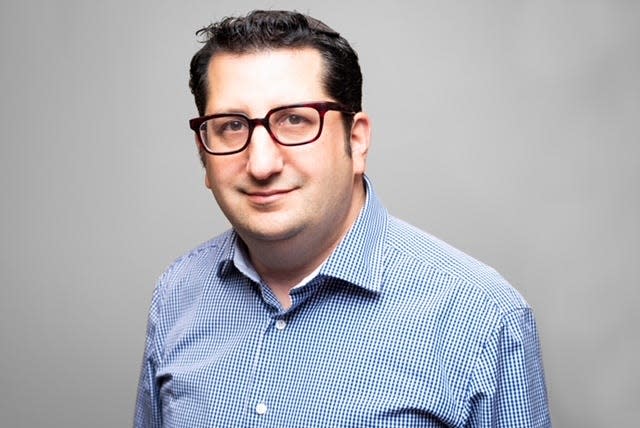A need to win every battle makes today's politics 'unrecognizable' |Opinion
We had a "blue moon" type of alignment recently: Easter, Passover and Ramadan were all celebrated on the same day.
Which led me to thinking: Can’t everyone have their (kosher for Passover) cake and eat it, too?
The Passover seder remains the most widely observed Jewish custom in the world.
As the Haggadah instructs us, we focus on teaching our children: “In every generation, a person is obligated to regard himself as if he had come out of Egypt, as it is said: ‘You shall tell your child on that day, it is because of this that the Lord did for me when I left Egypt.'"
Remembering persecution and commemorating tragedy are hardwired into the faith and public life of every Jewish community anywhere. But not as many in our modern-day cancel culture view it: "You're with me all the time or you're not just my enemy, you're a traitor to our highest cause." For Jews, memory is not destiny. Commemoration of the past isn’t a prophecy of our future.
More: Keeping the faith: God is calling for us to care for the strangers among us
Which is why so many Jews find the current political weltanschauung — from both partisan extremes — unrecognizable.
Culture wars from school boards to the White House seem rooted in an inability to give any credence to another’s viewpoint, a need to win every battle completely, and to retroactively shred an opponent’s argument of any credibility, with perhaps, for good measure, full-blown attacks on the other side’s integrity.

The Bible in no less than five separate verses demands — yes, demands of (or in biblical terminology, divinely commands) — the Jewish people to treat the stranger in their land well because we know what it’s like to be strangers ourselves in a strange land. At the time, it was Egypt, but it has played out that way across the millennia of Jewish history, too.
Still, the Bible also explicitly forbids us from harboring ill for the Egyptian people; “You shall not hate an Egyptian, for you were stranger in his land.”
Yesterday, in historical terms, we were refugees. Long before they enslaved us and murdered us, they welcomed us in during a famine. We recall both parts of this story.
We know, too, in 1947, 1967 and 1973—and all the years in between—modern-day Egypt led the pan-Arab campaign to destroy the State of Israel.
But today, one of Israel’s most important security relationships is with modern-day Egypt. Egypt’s eternal pride of place remains as the first Arab state to have signed a peace treaty with Israel.
More: Opinion: Jews see ourselves in the struggle of Ukrainian refugees
Today, Israel is the first country to have deployed a mobile field hospital on Ukrainian soil.
At way stations for displaced Ukrainians—Jew or Gentile—crossing borders into Austria, Hungary, Poland, and Romania, both Jewish communities worldwide, including the Jewish federations for which I’m proud to work and other Jewish communal non-governmental organizations such as the American Jewish Joint Distribution Committee and synagogue groups like Chabad are on the ground helping Ukrainians affected by the war with Russia.
Israeli governmental and quasi-governmental agencies, such as the Magen David Adom and the Jewish Agency are providing humanitarian services while expediting temporary and permanent emigration.
That same Ukrainian soil has been blood-soaked for centuries as Jews were targets for slaughter by anti-Semites of every ilk. Austria, Hungary, Poland and Romania all have their own imperfect Jewish history and likewise are locations of centuries-long campaigns of torture, terror, and death targeting Jews.
In Ukraine alone, Jews were murdered by the tens of thousands during the violent Chmielnicki Uprising, Jewish lives were taken and property sacked in the twin pogroms of Kishinev in the early 20th century and during the Holocaust, at least 1.5 million Jews in Ukraine were murdered. Fully one-quarter of Hitler’s Jewish victims were living in Ukraine, and we know Ukrainian collaborators of the Nazi regime shoulder some of that blame.
More: 'Let's drink to Ukraine!' Odesa Jews celebrate a wartime Passover under curfew
We will never forget this history.
In fact, it’s the foundation of healthy, honest relations between Ukraine and both the modern State of Israel as well as Jews everywhere. We indeed remember what Ukraine was.
We also know what it is.
We know modern-day Ukraine enacted the International Holocaust Remembrance Alliance definition to combat antisemitism and see it enjoying deep, bilateral trade and commerce with Israel.
Yes, as the Passover seder tells us, we are bound to remember history.
And yet, as the Bible requires, we’re forbidden to repeat it. Because knowing our past is the starting line for a partnership today that builds a better tomorrow.
But we probably can’t legislate that. Instead, for that better tomorrow for ourselves and our children, we’ll have to model it.
Howie Beigelman is executive director of Ohio Jewish Communities, the statewide, bipartisan government advocacy, public affairs and community relations voice of Ohio’s eight Jewish federations.
This article originally appeared on The Columbus Dispatch: Opinion: Ukrainians, Jews and Israel share future, past

